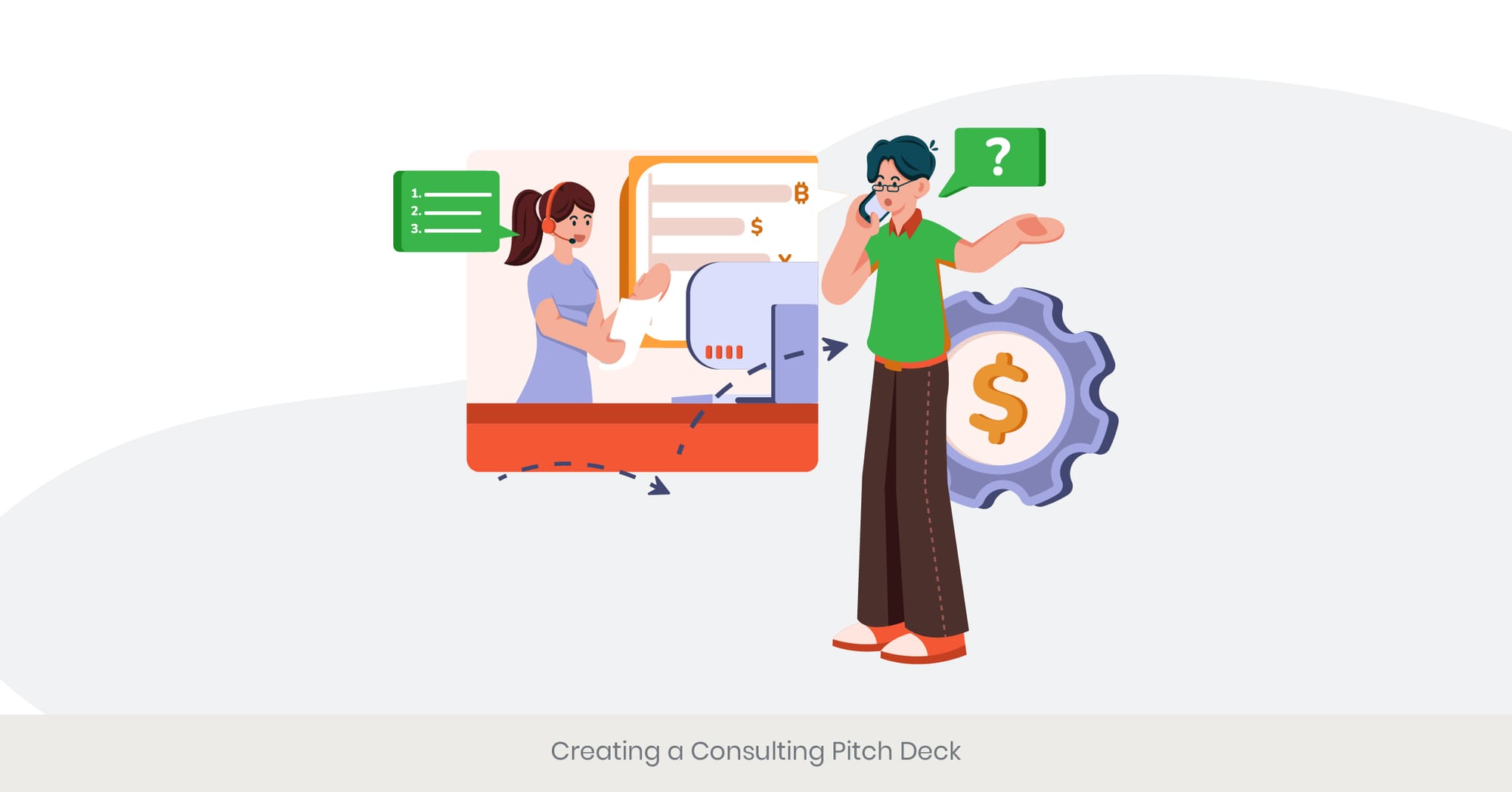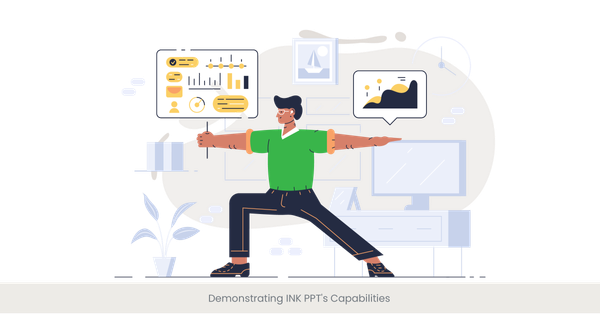
Establishing Credibility Through Past Client Results and Testimonials

Building Trust Through Proven Results
In the competitive landscape of consulting, establishing credibility is paramount for any consulting pitch deck. One of the most effective ways to build this credibility is by showcasing past client results and testimonials. When potential clients see concrete evidence of successful engagements, it not only strengthens their trust but also increases the likelihood of engaging your consulting services. A compelling consulting pitch deck should effectively highlight these success stories and client endorsements, making a powerful impact on the audience.
The Importance of Testimonials and Case Studies
Testimonials from past clients serve as social proof, validating the quality of your consulting services. They offer potential clients a glimpse into the positive experiences others have had and the tangible results achieved. According to a study by Nielsen, 92% of consumers trust recommendations from individuals, even if they don’t know them personally.
In the consulting realm, these testimonials can be presented as case studies, offering a narrative that illustrates the challenges faced by the client, the solutions provided by the consulting firm, and the measurable results achieved. This detailed backdrop not only showcases the effectiveness of the consulting firm but also reflects a deep understanding of client needs.
Real-World Applications of Credibility
One notable example is a marketing consulting firm that revamped its pitch deck by integrating testimonials from satisfied clients, along with key metrics demonstrating improved sales and engagement post-engagement. The consulting pitch deck highlighted specific challenges, solutions, and outcomes, leading to a significant increase in client inquiries.
Similarly, large consulting firms like McKinsey & Company frequently have pitch deck examples feature high-profile client testimonials and case studies, underscoring their effectiveness and bolstering credibility. Incorporating a mix of quantitative data and qualitative testimonials helps in creating a more engaging and trustworthy consulting slide for pitch deck designers.
Supporting Evidence and Statistics
According to a report by HubSpot, including testimonials in your consulting pitch deck can boost conversion rates by up to 34%. Additionally, the Edelman Trust Barometer reveals that 81% of consumers need to trust a brand before making a purchase, emphasizing the importance of credibility in consultancy.
This data highlights the critical role that established results and testimonials play in shaping a compelling pitch deck, ultimately leading to successful client engagements.
Clearly Defining Consulting Services and Scope of Work

Clarifying the Value of Your Offerings
Defining consulting services and the scope of work is essential in any consulting pitch deck. A clear outline not only helps potential clients understand what to expect but also establishes your expertise in delivering specific solutions.
By precisely detailing your consulting offerings, you can effectively communicate the value proposition of your services. This clarity is critical in distinguishing your consulting firm from competitors and helps in building a solid foundation for any successful pitch deck.
Understanding the Components of Consulting Services
Consulting services can range from strategic planning to operational improvements, and each offering has its unique scope of work. A well-structured consulting pitch deck should start by outlining the specific services provided, along with their objectives.
For instance, if your consulting firm specializes in digital transformation, detailing the phases of the process, from assessment graphic design to implementation, will help potential clients grasp the full spectrum of your expertise. By providing a concise description of each service, including deliverables, timelines, and methodologies, you ensure clients have a comprehensive understanding of what they will receive.
Illustrating Scope with Practical Examples
Consider a consulting firm that focuses on human resources. Their pitch deck effectively uses a section to define the services offered, such as talent acquisition, employee training programs, and performance management systems. By providing real-world examples and outlining the process of each service, the firm illustrates the impact these services can have on a client’s organization.
Such practical applications help to make the consulting slide its own pitch deck more engaging, showcasing not just what is offered but how much does it cost and can be implemented effectively to address specific client challenges.
Data-Driven Insights to Support Clarity
Research shows that clarity in communication significantly enhances client understanding and engagement. A study from the Harvard Business Review found that clear descriptions of service offerings increase the likelihood of clients engaging with a consulting firm by up to 40%. This statistic underscores the importance of defining services and scope within a consulting pitch deck.
By integrating key metrics and straightforward language into investor deck, you can create a compelling consulting pitch deck that resonates with potential clients and clearly articulates your unique value proposition.
Demonstrating Industry Expertise and Specialized Knowledge

Showcasing Your Authority in the Field
Demonstrating industry expertise and specialized knowledge is a cornerstone of an effective consulting pitch deck. Clients seek assurance that the consultants they hire not only understand their specific challenges but also possess the nuanced insights to address them.
By showcasing your authority through relevant experience, industry certifications, and thought leadership, you can significantly enhance your credibility in the eyes of potential clients. This establishes a connection that goes beyond mere service offerings and positions your firm as a trusted advisor.
Understanding the Importance of Industry Knowledge
Industry knowledge is vital for any consulting firm aiming to attract and retain clients. Consulting services that align with industry-specific needs and challenges showcase a deep understanding of market dynamics, regulatory environments, and competitive landscapes.
When defining your consulting services in your pitch deck, including details about past projects that involved specific industries will illustrate your specialized knowledge. Furthermore, mentioning any industry awards, certifications, or partnerships can bolster your position as an expert, making it easier for clients to trust your guidance.
Real-World Applications of Specialized Knowledge
For example, a consulting firm that specializes in healthcare could have find pitch deck examples highlight its experience working with hospitals to implement electronic health record systems. By including case studies that demonstrate successful outcomes, such as improved patient care metrics and increased operational efficiency, the pitch deck comes to life.
This practical application of specialized knowledge makes your consulting slide deck not just informative but engaging, showcasing the tangible benefits that your expertise can provide. This approach allows potential clients to visualize how your knowledge can help them navigate their unique challenges.
Validating Expertise with External References
Industry reports and studies can further validate the claims made in your consulting pitch deck. For instance, according to a McKinsey & Company report, companies that work with consultants who have specific industry knowledge see an average improvement of 20% in project success rates.
Additionally, showcasing endorsements or case studies from reputable organizations within the industry can serve as powerful testimonials. By backing your claims with credible data and references, you can reinforce your specialized knowledge and instill confidence in potential clients.
Outlining the Consultation Process and Methodologies Used

Mapping the Journey from Start to Finish
Outlining the consultation process is crucial for a compelling consulting pitch deck. Clients want to understand what to expect when they engage with your services. By clearly articulating the steps involved in your consultation process, you provide transparency and build trust.
A well-structured methodology not only showcases your professionalism but also helps potential clients envision how their project will unfold. Including flowcharts or diagrams in your consulting slide deck presentation can visually represent the journey, making it easier for clients to digest the information.
The Importance of Defined Methodologies
A defined methodology serves as the backbone of any consulting service. It offers a systematic approach to problem-solving, ensuring that no critical aspects are overlooked. Each phase, from initial assessment and strategy development to implementation and evaluation, should be articulated clearly.
Additionally, it’s important to emphasize how these methodologies have been tailored to meet the unique needs of different industries or clients. Highlighting specific frameworks, such as Agile or Six Sigma, can further establish your expertise and demonstrate a structured approach to delivering solutions.
Practical Examples of Consultation Processes
For instance, a consulting firm focusing on digital transformation might outline a process that begins with a digital maturity assessment, followed by stakeholder interviews and strategy formulation, and culminating in an implementation roadmap. Including real-world examples of how this process has been successfully applied can make your pitch deck more engaging.
For example, a case study showcasing how a client reduced operational costs by 30% through the adoption of your methodologies can provide tangible evidence of effectiveness. This brings your consulting pitch deck to life and allows potential clients to see the potential impact of your services.
Supporting Claims with Data and Research
To further validate the outlined processes, referencing industry benchmarks and studies can lend credibility. According to a study by Bain & Company, companies that follow a structured consultation process report a 30% higher client satisfaction rate. This data reinforces the value of a defined methodology and demonstrates the benefits that come from engaging with your consulting firm.
Moreover, providing insights into how your approaches align with industry standards can enhance your appeal to potential clients.
Showcasing the Measurable Impact of Offered Consulting Services

Demonstrating Value through Metrics
In the consulting industry, showcasing the measurable impact of your services is essential for building credibility and convincing potential clients of your value. Clients want to see tangible results that stem from your expertise. This requires integrating key performance indicators (KPIs) and metrics that demonstrate the effectiveness of your consulting services within your consulting pitch deck. By quantifying outcomes, you not only justify the investment in your services but also provide a compelling reason for clients to choose your firm over competitors.
Understanding Metrics that Matter
When discussing measurable impact, it’s crucial to focus on metrics relevant to the client’s specific business goals. This may include metrics such as revenue growth, cost reduction, increased customer satisfaction, or enhanced operational efficiency. For example, if your consulting services helped a client reduce their operational costs by 25% through process optimization, this is a significant figure that can influence decision-makers. Including such data in your pitch deck not only highlights your effectiveness but also aligns your services with the client’s aspirations for growth and improvement.
Real-World Success Stories
A strong way to showcase impact is through real-world success stories. For instance, you might detail how a retail client improved their inventory turnover by 40% after implementing your supply chain recommendations. Use case studies as part of your presentation design your consulting slide deck to illustrate these achievements in a narrative format, making the information relatable and impactful. Additionally, incorporating client testimonials that speak directly to the measurable benefits of your services can enhance your credibility and foster trust among potential clients.
Reinforcing Claims with Research and Data
To substantiate your claims, it's important to back them up with research and statistics. According to a study published by McKinsey, organizations that implement measurable consulting strategies see an average increase in performance of 20-30%. By referencing such studies, you provide a broader context that validates the effectiveness of your methodologies.
Furthermore, consider including industry-specific data that showcases trends related to your consulting services, as this can help potential clients understand the broader implications of your work.
Detailing Client Case Studies and Success Stories

The Power of Real-World Examples
Case studies are one of the most effective ways to convey the value of your consulting services. By detailing specific instances where your firm has successfully addressed client challenges, you provide potential clients with concrete examples of your capabilities.
A well-structured case study showcases not only the problem and solution but also the results achieved, making it an invaluable addition to your consulting pitch deck. This storytelling approach resonates with potential clients, allowing them to envision how your expertise can similarly benefit their organization.
Crafting a Compelling Narrative
When creating case studies for your consulting pitch deck, it’s important to structure them in a way that clearly outlines the problem, the approach taken, and the resulting impact. Start with a very compelling story or introduction that presents the client’s challenge in a relatable manner. Next, detail the methodologies and strategies you employed to address the issue, emphasizing your unique approach and expertise.
Finally, highlight the results, using quantifiable data to demonstrate success. This narrative not only makes the information accessible but also engages the audience, encouraging them to reflect on how your services can help them achieve similar results.
Highlighting Diverse Successes
In your pitch deck, it’s beneficial to include a variety of case studies that represent different industries or challenges. For example, if you’ve worked with a tech startup to enhance their operational efficiency, alongside a nonprofit organization aiming to boost community engagement, this showcases your versatility and depth of experience. Including diverse case studies in successful pitch decks can appeal to a broader audience and enhance your reputation as a consulting firm capable of adapting to various client needs.
Validating Impact with Data
To enhance the credibility of your case studies, be sure to include relevant data and testimonials. A well-documented case study may reference key metrics that indicate success, such as percentage increases in revenue, customer satisfaction scores, or reductions in operational costs.
According to Harvard Business Review, 70% of companies that leverage data-driven case studies report improved client trust and engagement. By incorporating this data into your pitch deck, you provide solid evidence of your consulting firm’s impact, reinforcing your credibility and effectiveness.
Communicating Unique Selling Propositions of the Consulting Firm

Defining Your Unique Selling Proposition (USP)
A Unique Selling Proposition (USP) is a key component that sets your consulting firm apart from competitors. In a crowded market, articulating your USP is crucial for grabbing the attention of potential clients. Your USP could be rooted in your specialized expertise, innovative methodologies, client success rates, or even your company's core values.
Clearly defining and presenting your USP in your consulting pitch deck allows potential clients to understand why they should choose your services over others. This clarity helps build trust and reinforces your position as a preferred partner in their growth journey.
The Importance of Differentiation
Differentiation is vital in the consulting landscape, where many firms may offer similar services. Effective communication of your USP requires a deep understanding of both your own strengths and the competitive landscape.
For example, if your consulting firm specializes in digital transformation for small businesses, highlight your proven track record of successful projects, your expertise in the latest technology, or even your tailored service packages that cater specifically to smaller organizations. This not only makes your offering distinctive but also resonates with the specific needs of your target market.
Real-World Examples of Effective USPs
Many successful consulting firms have effectively communicated their USPs in ways that resonate with their audiences. For instance, McKinsey & Company is well-known for its analytical rigor and comprehensive approach, often using data-driven insights to inform their recommendations.
Similarly, firms like Bain & Company emphasize their close collaboration with clients, showcasing a commitment to long-term partnerships. Including examples from such firms in your consulting pitch deck can serve as inspiration and guide you in crafting your pitch deck design agency own compelling USP.
Supporting Claims with Data and Testimonials
To substantiate your USP, incorporate relevant data, metrics, and testimonials in your pitch deck. For example, if your USP is built around client satisfaction, present statistics that demonstrate high satisfaction rates or client retention figures. Furthermore, featuring testimonials from past clients reinforces your claims and builds credibility.
According to a study by the Nielsen Group, 92% of consumers trust recommendations from individuals over brands, highlighting the importance of including authentic client endorsements in your pitch deck communication strategy. These elements work together to solidify your consulting pitch deck design services firm’s unique position in the market.
Including Client Endorsements and Expert Reviews

The Value of Client Endorsements
Client endorsements are invaluable when it comes to building credibility and trust for your consulting firm. Including testimonials from satisfied clients in your consulting pitch deck not only showcases your successful collaborations but also serves as social proof of your firm's capabilities.
When potential clients see endorsements from respected organizations or individuals, it reinforces the message that your services can deliver real value. By strategically placing these endorsements within your consulting slide and pitch deck development, you create a compelling narrative that highlights the effectiveness of your consulting services.
Best Practices for Gathering Endorsements
To effectively incorporate client endorsements into your consulting pitch deck, consider best practices for gathering and presenting this information. Reach out to past clients and request feedback on their experience with your firm. Aim for endorsements that specifically highlight outcomes, such as increased revenue, improved efficiency, or successful project completions.
These quantifiable results make your endorsements more persuasive. Additionally, ensure that the testimonials are authentic and come from reputable sources. The credibility of the client providing the endorsement can significantly enhance the weight of their words.
Showcasing Expert Reviews and Accolades
In addition to client endorsements, expert reviews and industry accolades can further bolster your consulting pitch deck. If your firm has received recognition from industry organizations or has been featured in reputable publications, be sure to include this information.
For example, if your consulting firm was named a "Top Consulting Firm" by a leading business magazine, highlighting this accolade in your pitch deck will add an extra layer of legitimacy. Expert reviews, especially those from well-known industry figures, can validate your expertise and reinforce your consulting firm's authority.
Validating Claims with Research and Statistics
To complement client endorsements and expert reviews, back up your claims with relevant research and statistics. According to a survey conducted by BrightLocal, 79% of consumers trust online reviews as much as personal recommendations. This statistic highlights the importance of leveraging client feedback in your pitch deck.
Additionally, consider incorporating industry-specific statistics that showcase the success rates of your consulting services. For instance, if 90% of your clients report achieving their desired outcomes, presenting this figure will provide strong validation for your consulting firm's effectiveness and reliability.
Pricing Models and Return on Investment for Clients

Understanding Pricing Models in Consulting
Pricing models are a critical component of any consulting pitch deck. They inform potential clients about how your consulting services are structured financially, and they can significantly influence the decision-making process. Common pricing models include hourly rates, fixed project fees, retainers, and value-based pricing.
Each model has its advantages and disadvantages, depending on the type of consulting service being offered and the client's specific needs. For instance, value-based pricing aligns the cost of services with the actual value delivered to the client, making it an attractive option for both parties. When presenting your pricing models, clarity and transparency are essential to instill confidence in potential clients.
Importance of Demonstrating ROI
Demonstrating the return on investment (ROI) is crucial in your consulting pitch deck, as clients need to see the tangible benefits of hiring your firm. Calculating ROI involves showcasing the financial gains or cost savings a client can expect from your services relative to the investment they make.
For example, if a consulting project costs $50,000 but is projected to increase the client's revenue by $200,000 within a year, that clear ROI will make a compelling case for your services. Including examples of past clients’ ROI will help to validate your claims and provide potential clients with a realistic expectation of the benefits they can achieve.
Real-World Examples of Successful Pricing Strategies
Consider incorporating real-world examples into your consulting slide deck to illustrate how your pricing models have successfully generated ROI for past clients. For instance, a case study could detail a project where a client engaged your services at a fixed fee of $30,000 and subsequently increased their market share by 25%, resulting in an additional $500,000 in revenue.
Such concrete examples provide compelling evidence of the effectiveness of your pricing models and the value you offer. Additionally, you might want to highlight any flexible pricing options that cater to different client needs, showcasing your commitment to client satisfaction.
Supporting Data and Research
To further validate your pricing models and claims of ROI, include supporting data and research within your consulting pitch deck. According to a study by McKinsey, companies that implement effective consulting services can see up to a 30% increase in profitability.
Highlighting such statistics not only underscores the financial impact of consulting but also reinforces the value of your services. Moreover, consider competitive advantage by providing industry benchmarks that compare your pricing models and ROI with competitors, helping potential clients see the advantages of choosing your consulting firm.
Call to Action for Scheduling an Initial Consultation or Audit

Crafting a Compelling Invitation
In a consulting pitch deck, a strong call to action (CTA) is crucial for guiding potential clients toward scheduling an initial consultation or audit. This section should create a sense of urgency and emphasize the value of taking the next step.
A well-crafted CTA not only motivates the audience to act but also reinforces the benefits they will gain by engaging with your consulting services. By clearly articulating what the consultation entails, you can help potential clients envision the transformative impact of your expertise on their business challenges.
Importance of a Strong Call to Action
A very compelling presentation or call to action plays a pivotal role in a successful pitch deck by providing a clear directive for potential clients. It should outline the process for scheduling a consultation, whether it's via a website, email, or phone call. Additionally, it can highlight what clients can expect during this initial engagement, such as an overview of their current challenges, identification of opportunities, and tailored recommendations. A pitch deck service a strong CTA acts as a bridge between interest and commitment, encouraging prospects to take the final step toward collaboration.
Real-World Applications and Examples
Many successful consulting firms utilize effective calls to action in their pitch decks to convert leads into clients. For example, a leading marketing consultancy might include a CTA like, “Schedule your free 30-minute strategy session today to discover how we can elevate your brand’s visibility and drive sales.”
This not only prompts immediate action but also assures the potential client of a no-obligation opportunity to engage with the firm. Such direct, benefit-oriented language enhances the likelihood of securing consultations and demonstrates confidence in the value offered.
Statistics and Insights
Research shows that incorporating a clear call to action can significantly increase response rates. According to a study by HubSpot, including a strong CTA can improve click-through rates by as much as 371%. Furthermore, when potential clients see an explicit offer for an initial consultation, they are 50% more likely to convert than without a CTA.
Consulting firms that leverage this tactic effectively not only streamline their client acquisition process but also create a more engaging experience for potential clients, leading to a higher conversion rate overall.
FAQs
What is a consulting pitch deck?
A consulting and pitch deck presentation is a visual presentation that outlines a consulting firm’s services, expertise, methodologies, and previous client successes to potential clients. It serves to persuade potential clients to engage with the firm by their impressive client list and highlighting the value and impact of their consulting services.
How to pitch for consulting work?
To pitch for consulting work, start by preparing a compelling consulting pitch deck that includes an overview of your services, past successes, pricing models, and ROI examples. Practice delivering your pitch, focusing on how your expertise aligns with the client's needs. Be sure to engage the client with questions and tailor your message to address their specific challenges.
How much should I pay for a pitch deck?
The cost of a full pitch deck design service can vary significantly depending on factors like the complexity of the project, the expertise of the designer or consultant, and the inclusion of additional services such as market research or data analysis. On average, professional pitch deck creation services can range from a few hundred to several thousand dollars.
How to write a pitch deck?
Writing a pitch deck involves creating an outline that covers key elements like the problem statement, proposed solution, market opportunity, business model, and team qualifications. Use concise and engaging language, supported by engaging visuals throughout, to convey your message effectively. Focus on storytelling to make your pitch memorable.
What does a professional pitch deck look like?
A professional, well designed pitch deck or template is visually appealing, well-structured, and free of clutter. It typically includes high-quality graphics, a consistent color scheme, and clear typography. Content should be concise, focusing on key points rather than dense paragraphs. The best pitch decks effectively communicate the company’s value proposition and are tailored to the audience.
What should be in a good pitch deck?
A good pitch deck should include an introduction, problem statement, solution overview, market opportunity, business model, competitive analysis, team qualifications, and financial projections. It should also present clear evidence of the business idea plans past successes and include a strong call to action to guide the audience towards the next steps.
How much do people charge for pitch decks?
Charges for pitch decks can vary widely based on the complexity and length of the deck, as well as the expertise of the designer or consultant. Basic pitch decks may cost around $500 to $2,000, per leading pitch design agency while more comprehensive decks created by experienced, pitch deck design consultants can cost $5,000 or more.



%20(1).jpg)
%20(1).jpg)


